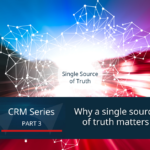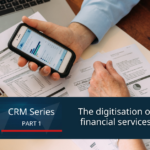Summary
This 2nd article in the CRM series looks at Microsoft Dynamics 365 as a CRM solution within the financial services sector.
Despite challenging economic conditions and slow sector growth projected by some[1], the industry is still a hive of activity, presenting significant opportunities to those equipped to capitalise upon it. For those able to successfully deliver a digitally enabled customer experience and capable of leveraging their data smartly, there is an abundance of opportunities. A key tool in achieving this is investing in core technologies that facilitate better customer data management.
This article at a glance:
- What’s happening in wealth and pensions, and why.
- 5 reasons why Microsoft Dynamics 365 is a highly effective CRM solution for wealth and pension management firms;
- Its ability to solve complex problems now and, in the future;
- It can improve the way sales and distribution teams work individually and together;
- It makes attracting and retaining more clients easier work;
- How it enables firms to better “know your customer”;
- How it facilitates a hybrid approach to customer service.
A changing landscape
The financial services sector is a hive of activity and transformational change. Massive regulatory change, changing consumer attitudes to long-term financial planning, and consolidation within the sector are keeping firms on their toes.
We recently spoke about these changes on a tech podcast we were invited speak on. In this conversation we discussed the importance of crm software for wealth and pensions firms to keep up with this fast rate of change remain competitive and compliant amidst the FCA Duty of Care regulatory changes. (Read “Practical questions for board and senior management about your infrastructure, in addressing the new Consumer Durty Regulations“.
This second article in the crm series summarises, some of the points raised on this podcast and examines why Microsoft Dynamics 365 is a highly effective CRM platform for wealth and pension management firms. Many of these features admittedly can be found in other reputable and modern CRM platforms. Yet, we believe that seamless integration with the whole Microsoft ecosystem places it heads and shoulders above its competitors.
5 reasons Microsoft Dynamics 365 is a highly effective CRM solution for wealth and pension firms:
1. It solves complex problems now and, in the future
From the basic to the highly complex, Dynamics 365 can handle high volumes of customer data from across your organisation in a secure and intuitive manner. The ability to take either the ‘out-of-the-box’ solution and configure and fine tune, or ‘build from scratch’ to solve whatever problems offers organisations the best of both worlds. As a low-code platform, it is quick and cost-effective to build, maintain and update. From client acquisition and client management to process improvement and risk management, the customisable and flexible nature of Microsoft Dynamics 365 means it can be built to address the issues affecting financial service providers right now.
The complexity of interacting with brokers, partners, and regulatory agencies is easily managed with Dynamics 365, which removes disjointed data management and time laborious data input from one system to another. And when it comes to stringent compliance rules that financial services must abide by, the security features and centralised nature of Dynamics 365 means compliance processes can be built into the system, offering safe data storage and evidence of your Duty of Care activity to regulators.
We often see with legacy systems that the system built ten years ago or more may have been perfect for the organisation back then, it is now not fit-for-purpose, and these legacy systems are often highly inflexible. So when faced with newer challenges and problems to solve, the solution is often a workaround and more of a square peg in a round hole. Clunky navigation makes what should be a simple administrative process laborious and painful for users.
With Dynamics 365, as you will go on to discover, completely eliminates this issue for good. With no compromises and no fear that the system will age poorly either, as features and tools can be adapted as your firm grows and changes.
2. It improves the way your teams work individually and together
Getting individuals to work more productively and work together effectively is an instant way to boost the growth of any firm. Microsoft Dynamics 365 offers a huge selection of tools and features that enable individuals to work smarter and reduce administrative workload.
The integrated nature of the system means that it is easier than ever for teams to collaborate, thanks to the seamless integration with the Microsoft ecosystem. For example, users can jump from outlook or teams to sharepoint or dynamics 365 and see whatever data they need in that application, making accessing and updating data super-efficient.
Even where a provider’s existing tech stack utilises various 3rd party platforms and systems, integration into the microsoft ecosystem using API technology will effectively pool this information into one central area, again eliminating the dreaded data silo and offering better data insight and the coveted single source of truth. (We’ll be discussing this in more detail in our next CRM article).
And when it comes to the management of data and document generation, of which there can be vast volumes, automation tools can again help reduce the dreaded administrative burden, allowing advisors and administrators to focus more time on activity that counts working with clients, attracting new clients and thanks to document automation and workflows, the client experiences a smoother more efficient interaction with your brand.
This focus on making lives easier makes the buy-in from users far more successful from the get-go even if those same users were originally resistant to change. This cynical view of new CRM technology is understandable, when users have felt the pain of ineffective systems of the past, or worse, previous crm investments have not lived up to their hype. Yet, Microsoft Dynamics 365, when planned and implemented correctly will quickly be viewed as an asset not a hindrance by the work force.
For senior levels and management again, Dynamics 365 makes easy work of augmenting and presenting data to offer the ‘bird’s eye view’ that management need to be able to make smart, informed decisions. Thanks to the multilevel reporting capabilities of Microsoft Dynamics 365, users are afforded boundless insights.
With many CRMs, the report dashboards are often pre-baked or, at best, limited to specific data fields, but the customisation and centralised nature of dynamics means all levels of management across all business functions can gain sight of the overall picture or even drill down into the detail. And as the reports are in real-time and use the data sitting there within the CRM, not a user’s outdated spreadsheet sat on a desktop, decision-makers and team leaders have confidence that the data is telling the right story.
3. It will make attracting and retaining clients easier work
As we have already outlined, Dynamics 365 is designed to make people’s lives easier, reduce admin, increase productivity and encourage collaboration across the organisation. This reduction in administration frees up advisors’ time, allowing them to focus more on client activity. This can only benefit the client and the company as a whole. Satisfied clients are loyal clients and the power of word of mouth cant be overlooked either.
And whilst the advisor can deliver a more personalised service, centralised marketing communications can be automated and integrated into the wider customer comms strategy. This results in sales and distribution working closer. And with cutting-edge marketing tools, customer acquisition and sales pipeline visibility take the guess work out of sales and marketing effectiveness.
This better visibility and control over sales and distribution activity will grow in importance as Consumer Duty regulation begins to kick in, and providers and advisors are pressured to place even greater emphasis on ensuring better consumer outcomes.
4. It enables you to truly “know your customer”
The tightening regulation set by the FCA’s Consumer Duty demands that firms ensure that customers are treated fairly and experience good outcomes. For this to become a reality, truly knowing the customer is at the heart of this transformation.
To enable this transformation, firms can utilise modern crm technology to gain better customer insight, segment more accurately and understand their customer needs and wants in greater detail. As we have highlighted earlier, the centralised nature of Dynamics 365 will make delving into customer data and gaining accurate insights possible.
This customer insight will help firms mitigate risk better, and the flexibility and custom-built nature of Dynamics 365 means that new processes and procedures introduced as part of this legislation, can be built into the CRM.
And with a wide range of tools that enable greater personalisation of communications, control of sales channel communications, monitoring and assessment of sales and marketing communications becomes much simpler. Furthermore, digital logging of all communication, whether directly from the advisor or the central team, is logged, making auditing simpler.
Other features in the Dynamics 365 marketing suite, such as questionnaires, can be used to be more proactive on customer feedback. For example, automated emails may be sent as part of the onboarding process. This information is then readily and easily available to appropriate staff members.
5. It enables a hybrid approach to customer service
The dawn of the digital age is here and accelerating quickly. The use of “robo-advisors” is nothing new, and customers’ expectations regarding communications and customer experience are rising.
Firms can raise the bar with the right tools and deliver the digital experience customers expect and want with the right tools. And Microsoft Dynamics packs a punch when it comes to delivering the tools needed to deliver a digital experience, complemented with the human touch.
The broad range of communications tools in the Dynamics 365 suite can not only improve direct communications in ways we have previously outlined, but customer service tools can elevate the customer journey and deliver that coveted ‘hybrid’ experience, across the entire customer journey. From online self-service portals to ai customer rooting, to automated emails and customer feedback tools.
As all customer data is stored securely in one central database, so whoever happens to be dealing with a customer has full sight of the client’s communication history and touchpoints. Combining this digital-first approach with the personal touch of an advisor, the customer experience is raised to meet the expectations of today’s consumers.
Summary
When it comes to CRM solutions that are truly fit-for-purpose and suited to the complex needs of financial services, Dynamics 365 offers countless benefits. We have listed just a handful of reasons why we believe it is a compelling solution to a very pressing problem of effective digitisation.
To listen to our conversation on CRM software in financial service listen to the CRM podcast RocketPod.
Hesmur offers CRM products built specifically for the financial services sector and also offers strategic guidance on digital transformation to leaders, to help them address the most pressing matters and accelerate change.
CRM Series
Part 1
CRM is a central component to successful digitisation in financial services | Hesmur
Part 3
Why a single source of truth matters to financial service providers | Hesmur
Contact us
Call: +442045742661
email: info@hesmur.com
References
[1] Global Data, United Kingdom (UK) Pensions Market Size, Trends, Competitive Landscape and Forecasts, 2022-2026
























